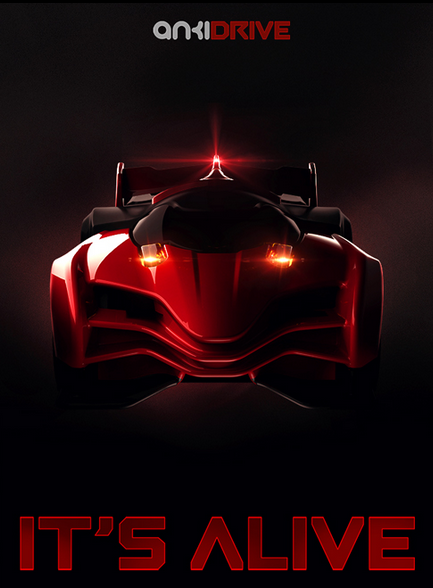Remember the cute Anki Drive demo from WWDC? Well what you might have missed is that the toy car racing game was just a front for a hardcore robotics artificial intelligence startup that could let machines understand exactly where they are in the physical world. Andreessen Horowitz, Index Ventures, and Two Sigma see the potential, as they’ve invested a total of $50 million Series A and Series B funding to help Anki launch in the fall.
Video games have long had computer-controlled players. They’re the bots you shoot, dribble around, or race against. But they existed solely in the digital world. Anki brings this artificial intelligence into the meatspace through robotics. At first, that will make for fun games. You race an RC car against artificially (or actually) intelligent opponent who can try to block you from passing them — using the same algorithmic calculations a human brain makes while driving.
In the future, Anki won’t just be a toy, though. Perhaps it will let robots dodge human workers in factories, or keep mechanized assistants from tripping over your feet within the home? There are more phone-controlled IRL Anki products to come. Thus far, no one’s disclosing more details.
“It’s extraordinarily sophisticated software,” said investor Marc Andreessen in a phone interview this morning, “and closer to the Google Self-Driving car than anything else. And really fast. We think it points to the direction of the future, bringing AI into the living room.”
From the Anki blog:
At first glance, it’s a racing game that pits real cars against players and each other – but after playing for a few minutes, you’ll see what makes Anki Drive special: We are making the first video games in the real world, and our team has worked tirelessly on the robotics and AI challenges that this presents.
Each car is equipped with sensors and intelligent software to make thousands of decisions every second. We use mobile devices not as remote controls, but as drivers for an immersive real-world experience. And we took great care to make sure that despite everything under the hood, the final experience is intuitive and entertaining.”
While there’s definitely some Internet of Things element to this, Andreessen tells me that he considers Anki a whole new category of low-cost robotics made possible by a low-energy, Bluetooth update on the iPhone that now allows the phone to be a control unit for dozens of devices. Anki is one of the very first startups to capitalize on this tech, which explains the catbird seat of getting to launch onstage at Apple’s developer conference, and in front of the 27,000+ people watching the Apple live stream.
“The way robotics and AI come into the market is the way computers come into the market, very expensive,” Andreessen explained, “These guys are doing the exact opposite, at the lowest cost possible. They’re going for quantity, they’re going for scale. Sort of like the smartphone versus the mainframe.”
Apple CEO Tim Cook bolstered the startup’s lofty goal while onstage: “When we look at Anki Drive, we see the first steps of the future of robotics and artificial intelligence being realized. We see an entertainment experience transformed today, and we see countless possibilities in the future.”
In addition to having a friend in Tim Cook, Anki apparently beguiled Andreessen, who will be taking a place on the startup’s board as well as Index Ventures investor Danny Rimer, who echoed Cook in calling the tech the “first base in a sweeping robotics revolution.” It’s the RapGenius play: Come into the market with a fun, appealing consumer product, and then surprise everyone with your depth, impressive tech and visionary aspirations.
It doesn’t hurt that the team is a group of robotics PhDs from Carnegie Mellon. “Guys like this historically don’t build low-price products. They’re all busy building million-dollar products and not $200 products,” Andreessen emphasized. “We think it’s a new category. AI and robotics have hit the point where they’re mainstream.”
While Andreessen did not reveal what their next product would be or an exact price point, he did confirm that the entire Anki Drive kit would eventually sell for hundreds of dollars.
So will the next Anki product be a consumer household connected device like a souped-up Roomba? “They’ve got way more fun ideas than that.”
